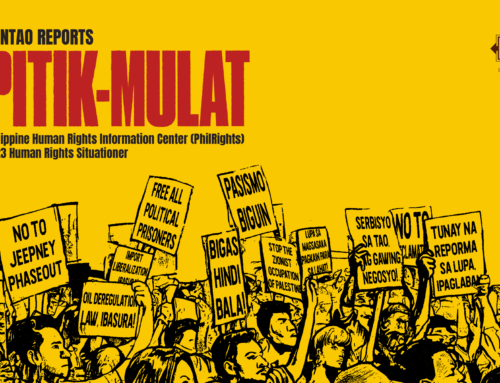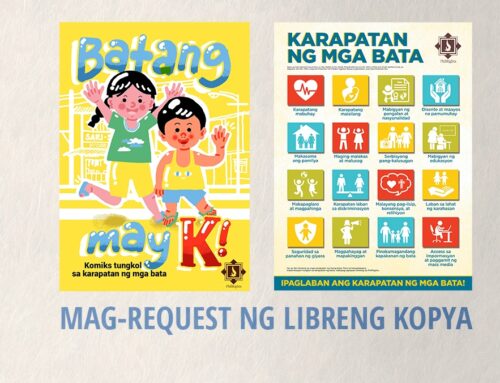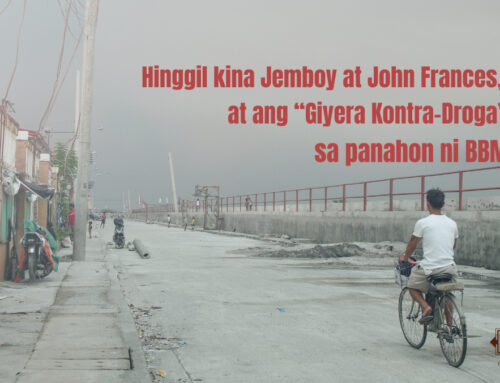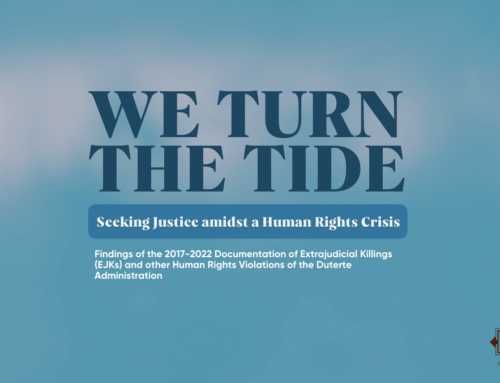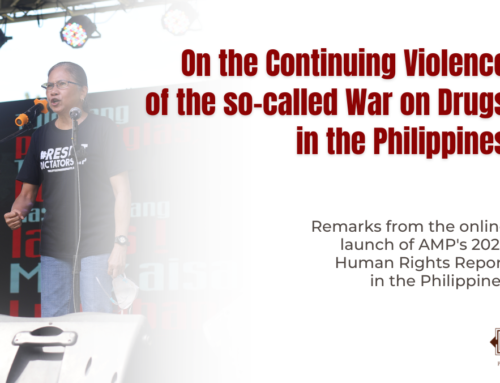by Pineng Garcia
The so-called war on drugs, still an unfolding nightmare in many poor communities, has not spared children. President Duterte, back in 2016, characterized the children who died during anti-illegal drug operations as “collateral damage.” In July this year, neophyte senator and former police chief Ronald “Bato” dela Rosa, summed up the tragic death of a three-year-old girl during another antidrug operation in two words: “Shit happens.”
What these statements reveal is the brazen disregard for the rights of children and a betrayal of the country’s obligation to respect their right to life, as required under the Convention of the Rights of the Child, the basic international law on Children’s Rights, which the Philippines is a State party to.
The Children’s Legal Rights and Development Center has reported having documented at least 94 children killed in the course of the so-called war on drugs. PhilRights, in our latest report, has recorded at least five more cases. Not one of these deaths have been brought to justice.
Beyond the loss of these innocent lives, PhilRights’ own documentation has revealed that at least 140 more children were left orphaned because they lost either their mother, father, or both to alleged extrajudicial killings.
Fear and Insecurity
The deaths of their parents meant more suffering, as children and the remaining adults in their extended families are left to deal with the many negative consequences of having a family member killed.
“Unang-una na nararamdaman nila ay takot. Takot na maulit muli, takot na balikan sila, takot na pati mga anak ay madamay. Takot na sila sa ganong sitwasyon na karamihan ng napapatay ay walang kadahilanan. Kaya para sa kanila hindi na ligtas ‘yung buhay nila. Nawalan na sila ng seguridad. Na kahit sino, bata man o matanda ay pwedeng kitilin ang buhay,” says Camille, a human rights defender from Sampaloc. The frequency of killings in many urban poor communities in the country have created an atmosphere of fear and insecurity. Families left behind are in a constant state of paranoia and untreated trauma.
“’Yung mga anak ko parang ayaw nang lumabas nang bahay. Parang ayaw nila na nakikipag-usap sa mga tao.” This from a mother whose husband was killed in the early months of the anti-illegal drug campaign.
This violation on their right to security has impeded the growth of the children left behind. Imagine a child not having the freedom to play in the streets and learn from their immediate environment because of their fear of persons in blue uniforms and mobile patrols.
Acting Out
In some cases, children left behind have started to act out in violent and aggressive ways.
“Parang nagri-rebelde ‘yung mga bata eh. Kung sino na lang minsan sinusugod nila sabay sabi, ‘Ganitong ginawa kay Papa ko.’ Nung nakaraan nga, ‘yung pangatlo ni [an EJK victim] nanuntok ng bata. Sabi ko, ‘Huwag ka manuntok.’ Sabi niya, ‘Kasi di ba ganyan din ginawa kay Papa?’” observes Anita, a human rights defender from Caloocan. She also adds, “‘Yung apo ko, takot siyang lumabas. Makakita lang siya ng pulis, umiiyak. Nagtatago sa ilalim ng lamesa”
For Lady, another human rights defender who works closely with families of alleged EJK victims in Navotas, the effects on children are immediately visible. “‘Yung takot, ‘yung phobia, ‘yung kinikimkim na galit lalo na sa mga bata na mismong nakasaksi sa pagpatay.” She notes the case of one teenager who, desperate to cope with the loss of a father, decided to marry early. “Siyempre napakahirap noon at malaki ang epekto nito sa pagkain, sa kanyang pag-aaral, at sa kanilang pamumuhay. Ang escape niya is mag-asawa kasi ang asawa niya ang bubuhay sa kanya.”
On Education
Because the majority of the adults killed are primary breadwinners for the family, the socioeconomic well-being of children left behind are also put in jeopardy.
Anita has seen this firsthand: “Kung minsan sabi ng Mama niya, ‘Wala akong mapabaon, wala akong mapakain kaya hindi na lang siya pumapasok sa school.”
Indeed, the right to education of children left behind have been compromised. Most children were forced to stop their schooling because their families could no longer afford to support them. Some of them have stopped because they were still traumatized by the death of the parent.
Among children who were able to continue their studies, many have shown a loss of interest. Their teachers have raised concerns on the performance and behavior of the children in school. A few have reported feeling bullied or stigmatized for being related to an alleged drug user.
Food Insecurity
Some families routinely experience food insecurity which directly affects the health of the children. While it can be said that families in urban poor communities are not unfamiliar to having little to nothing on their dining table, the loss of their primary breadwinner aggravated their already difficult situations at home.
“Hindi ko sila kayang suportahan lahat sa pagkain. Sa mumurahing noodles na lang, says a now single mother from Bulacan.
Anselma, another mother from Bulacan, describes how things have changed: “Halimbawa po sa bigas, imbis na makakain ka ng halagang Php 50 na bigas, dadaanin mo na lang sa halagang trenta. Kasi kung sandaan lang pera mo, meron ka nang ulam, meron ka nang bigas.”
Since losing her husband, Anselma has had to reduce how much her family is able to eat in a given day, “Almusal at tanghalian magkasama na. Maghihintay ka na lang ng gabi para makakain ka ng hapunan. Nakakaiyak nga kasi minsan may gustong kainin ‘yung anak mo pero hindi mo maibigay kasi wala kang pera.”
These stories, and many more collected over two years of in-depth documentation of the human rights violations occurring in the context of the so-called war on drugs, have allowed us to describe just how multidimensional the impact and consequences of this campaign has been to so many families and their children.
A point that has to be made, again and again, is that suffering, especially among children, does not end when a family member is killed. The failures of this government, through action and inaction, have compromised children who are among the most vulnerable members of our society.
As we mark Children’s Month, we want to raise the alarm on this continuing tragedy that has impacted so many of our young. We urge everyone, today and in the future, to fight for and with them.
*Names have been changed to protect the identities of those interviewed.




